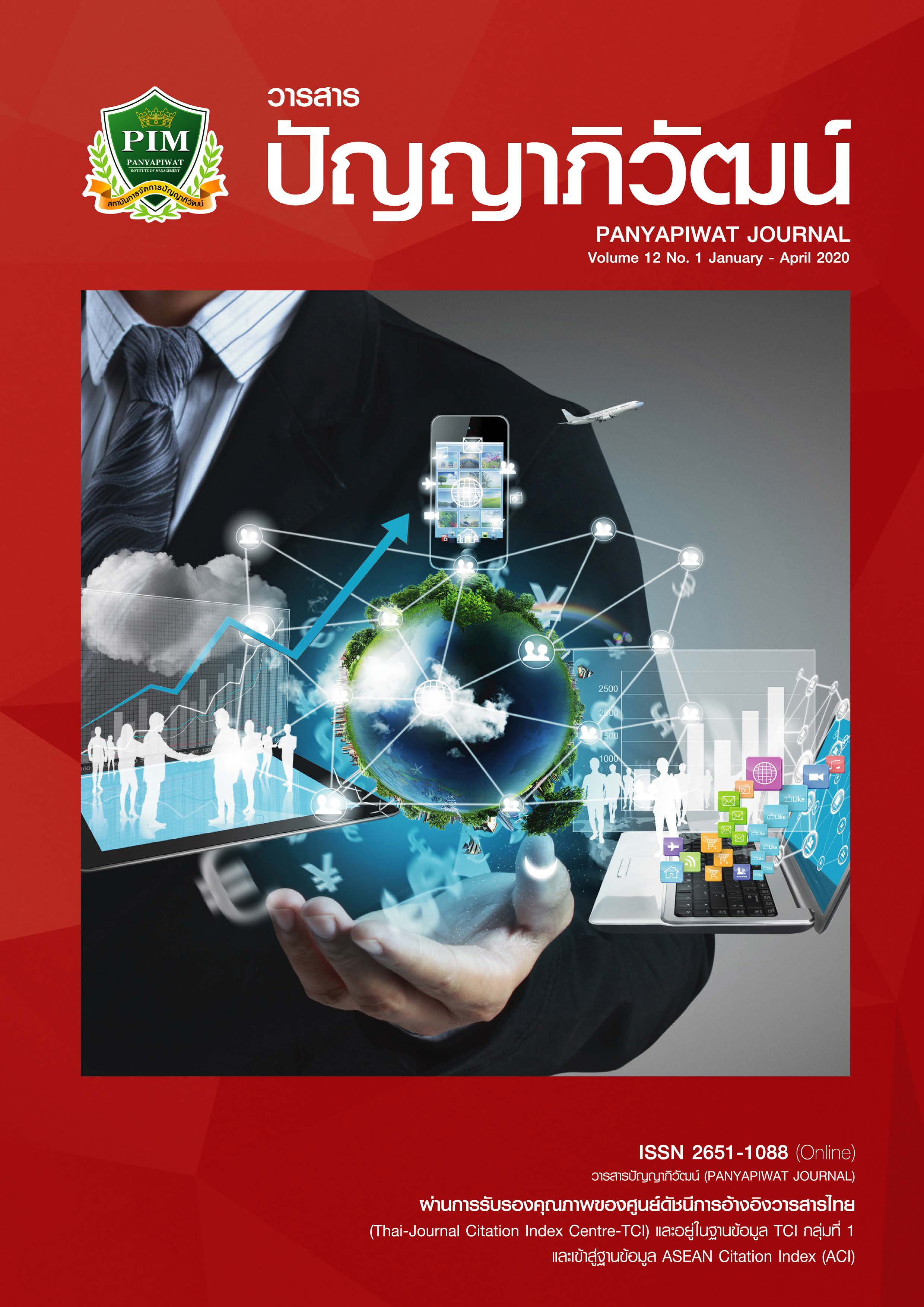รูปแบบการพัฒนาผู้นำการเปลี่ยนแปลงสำหรับการบริหารจัดการธุรกิจโรงแรม ในเขตจังหวัดชายแดนไทย-ลาว
Main Article Content
บทคัดย่อ
การวิจัยครั้งนี้มีวัตถุประสงค์ 1) เพื่อศึกษาองค์ประกอบของผู้นำการเปลี่ยนแปลงสำหรับการบริหารจัดการธุรกิจโรงแรม ในเขตจังหวัดชายแดนไทย-ลาว 2) เพื่อสร้างรูปแบบการพัฒนาผู้นำการเปลี่ยนแปลงสำหรับการบริหารจัดการธุรกิจโรงแรม ในเขตจังหวัดชายแดนไทย-ลาว 3) เพื่อประเมินรูปแบบการพัฒนาผู้นำการเปลี่ยนแปลงสำหรับการบริหารจัดการธุรกิจโรงแรมในเขตจังหวัดชายแดนไทย-ลาว กลุ่มตัวอย่างที่ใช้ในการวิจัยมี 3 กลุ่ม คือ 1) ผู้บริหารและหัวหน้างานธุรกิจโรงแรม จำนวน 400 คน 2) ผู้เชี่ยวชาญสำหรับการพิจารณาความสมบูรณ์ของร่างรูปแบบ จำนวน 5 ท่าน 3) ผู้ทรงคุณวุฒิและผู้เชี่ยวชาญในการบริหารจัดการธุรกิจโรงแรมสำหรับการประเมินความเหมาะสมและความเป็นไปได้ในการนำรูปแบบไปใช้ในการพัฒนาผู้นำการเปลี่ยนแปลงสำหรับธุรกิจโรงแรมจำนวน 17 ท่าน สถิติที่ใช้ในการวิเคราะห์ข้อมูล ได้แก่ ความถี่ ร้อยละ ค่าเฉลี่ย ค่าเบี่ยงเบนมาตรฐาน การวิเคราะห์การถดถอยพหุคูณ (Stepwise Multiple Regression Analysis)
ผลการวิจัยพบว่า 1) องค์ประกอบสำคัญที่ส่งผลต่อการเป็นผู้นำการเปลี่ยนแปลงสำหรับการบริหาร จัดการธุรกิจโรงแรม ในเขตจังหวัดชายแดนไทย-ลาว มี 7 ด้าน ได้แก่ (1) ด้านการมีวิสัยทัศน์กว้างไกล (2) ด้านการปรับตัวรองรับการเปลี่ยนแปลง (3) ด้านการมีมนุษยสัมพันธ์ (4) ด้านการสร้างแรงจูงใจ (5) ด้านการเป็นแบบอย่างที่ดี (6) ด้านการพัฒนาพนักงาน (7) ด้านการสนับสนุนการทำงานเป็นทีม 2) ผลการสร้างรูปแบบการพัฒนาผู้นำการเปลี่ยนแปลงสำหรับการบริหารจัดการธุรกิจโรงแรม ในเขตจังหวัดชายแดนไทย-ลาว โดยภาพรวมการสร้างรูปแบบการพัฒนาผู้นำการเปลี่ยนแปลงสำหรับการบริหารจัดการธุรกิจโรงแรม ในเขตจังหวัดชายแดนไทย-ลาว มีความสมบูรณ์อยู่ในระดับมากที่สุด 3) ผลการประเมินรูปแบบการพัฒนาผู้นำการเปลี่ยนแปลงสำหรับการบริหารจัดการธุรกิจโรงแรม ในเขตจังหวัดชายแดนไทย-ลาว มีความเหมาะสมอยู่ในระดับมากที่สุดทุกด้าน ส่วนความเป็นไปได้ในการนำรูปแบบการพัฒนาผู้นำการเปลี่ยนแปลงสำหรับการบริหารจัดการธุรกิจโรงแรม ในเขตจังหวัดชายแดนไทย-ลาวไปปฏิบัติ พบว่า มีความเป็นไปได้ในการนำไปปฏิบัติอยู่ในระดับมากที่สุด 2 ด้าน คือ องค์ประกอบด้านการเป็นแบบอย่างที่ดีและองค์ประกอบด้านการสร้างแรงจูงใจ ส่วนองค์ประกอบด้านอื่นๆ อยู่ในระดับมากตามลำดับ
Article Details
“ข้าพเจ้าและผู้เขียนร่วม (ถ้ามี) ขอรับรองว่า บทความที่เสนอมานี้ยังไม่เคยได้รับการตีพิมพ์และไม่ได้อยู่ระหว่างกระบวนการพิจารณาลงตีพิมพ์ในวารสารหรือแหล่งเผยแพร่อื่นใด ข้าพเจ้าและผู้เขียนร่วมยอมรับหลักเกณฑ์การพิจารณาต้นฉบับ ทั้งยินยอมให้กองบรรณาธิการมีสิทธิ์พิจารณาและตรวจแก้ต้นฉบับได้ตามที่เห็นสมควร พร้อมนี้ขอมอบลิขสิทธิ์บทความที่ได้รับการตีพิมพ์ให้แก่สถาบันการจัดการปัญญาภิวัฒน์หากมีการฟ้องร้องเรื่องการละเมิดลิขสิทธิ์เกี่ยวกับภาพ กราฟ ข้อความส่วนใดส่วนหนึ่งและ/หรือข้อคิดเห็นที่ปรากฏในบทความข้าพเจ้าและผู้เขียนร่วมยินยอมรับผิดชอบแต่เพียงฝ่ายเดียว”
เอกสารอ้างอิง
Anuroj, K. (2014). Leadership: Tips for Successful Sustainable Development. Royal Thai Air Force Medical Gazette, 60(3), 53-56. [in Thai]
Auareesuksakun, A. & Chuntuk, T. (2016). Transformational Leadership: Changing Challenges to Achieve Organization Sustainability. Veridian E-Journal, 9(1), 845. [In Thai]
Bass, B. M. & Avolio, B. J. (1993). Leadership theory and research: Perspectives and directions. San Diego, CA: Academic Press.
Bass, B. M. & Riggio, R. E. (2006). Transformational leadership. Mahwah, NJ: Erlbaum.
Chew, M. M., Cheng, J. & Petrovic-Lazarevic, S. (2006). Managers’role in implementing organization change: case of the restaurant industry in Melbourne. Journal of Global Business and Technology, 2(1), 58-67
Coghlan, D. (1993). A person-centred approach to dealing with resistance to change. Leadership & Organization Development Journal, 14(4), 10-14.
Duck, J. D. (1993). Managing change: the art of balancing. Harvard Business Review, 71(6), 109-118.
Hleekpai, P. (2014). Factors Affecting the Innovativeness of Hotel Business in Southern Border Provinces of Thailand. Modern Management Journal. 12(1), 11-21. [in Thai]
Karasawai, F., Pulcheorn, N. & Jamornman, W. (2012). The Study of Successful Characteristics of Hotel Business Entrepreneurs in the Lower Northern Provinces of Thailand. Journal of Business, Economics and Communication. 7(1), 39-50.
Kotter, J. P. (1996). Leading Change. Boston, MA: Harvard Business School Press.
Mehrens, W. A. & Lehmann, I. J. (1991). Measurement and Evaluation in Education and Psychology (4th ed.). New York: Holt, Rinehart and Winston.
Mohsen, A. & Mohammad, R. D. (2011). Considering Transformational Leadership Model in Branches of Tehran Social Security Organization. Social and Behavioral Sciences, 15, 3131-3137.
Pietersen, W. (2002). The Mark twain Dilemma: the theory and practice of change leadership. Journal of Business Strategy, 23(5), 32-37.
Podsakoff, P. M., MacKenzie, S. B., Moorman, R. H. & Fetter, R. (1990). Transformational leader behaviors and their effects on followers’trust in leader, satisfaction, and organizational citizenship behaviors. Leadership Quart, 1, 107–142.
Roungkun, J. (2013). Organization Chang: Concept Process and Rowe of Human Resource Management. Panyapiwat Journal, 8(Suppl), 194-203. [in Thai]
Sattayopat, P. & Meksuwan, A. (2018). The Causal Relationship Model Between Entrepreneurship and Marketing Orientation effecting the Competitive Advantage of Small-sized Hotels in Chiang Mai. Journal of Graduate Studies in Northern Rajabhat Universitie. 8(14), 27-40. [in Thai]
Shuai, A. & David, B. (2012). Talent Management Definition and Talent Management recognition in Chinese private-owned enterprises. Journal of Chinese Entrepreneurship, 4(2), 143-163. [in Chinese]
Sorat, S. & Pongpua, M. (2013). The Causal Relationship Model of Entrepreneurial Leadership Effecting Business Performance of Family Business Entrepreneurs Focused on Resort and Hotel in Thailand. Journal of Association of Researchers. 18(1), 1-19. [in Thai]
Steve, N. (2011). Preparing Our Leaders for the Future. Strategic HR Review, 11(1), 5-12.
Theepapan P. (2007). New Organization Behavior. Bangkok: Amorn Printing. [in Thai]
Tokitpaiboon, K. (2015). Moderation of Psychological Capital between Transformational Leadership, Job Satisfaction and Organizational Citizenship Behavior. Master of Arts degree Industrial and Organizational Psychology Faculty of Liberal Arts, Thammasat University. [in Thai]


